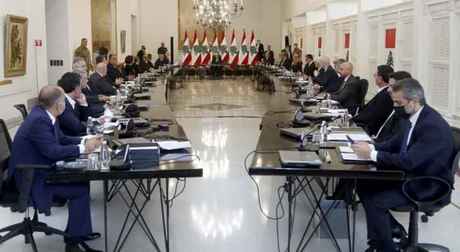Cabinet Studies EDL Loan, Customs Dollar in New Session

Cabinet convened Monday at the Grand Serail to continue the discussion of the draft state budget.
The session will focus today on social welfare to families in need as Social Affairs Minister Hector Hajjar is expected to submit a proposal today.
The customs dollar will also be studied today as no agreement has been reached yet concerning the LBP to USD exchange rate that will be used to calculate customs on imports. The current rate is 1,500 Lebanese Lira to 1 dollar.
Cabinet will also discuss today a treasury loan to purchase fuel for power generation.
On Saturday, Cabinet had asked Energy Minister Walid Fayyad to justify a treasury advance that his ministry had requested as a funding for Électricité du Liban. The topic was postponed for today for further study.
Cabinet has been meeting since Tuesday to discuss the 2022 draft budget, a prerequisite to unlock the International Monetary Fund aid. It will resume its meetings on Wednesday morning.
Same tune pregnant with corruption. Fayyad plan does not mention renewable, knowing well that Lebanon is blessed with solar, wind, hydro, and wave power. Is DOCTOR aware of UAE Masdar contracts to generate solar power for 2.4 cents a KW, or Saudi contract for solar power at 2 cents/KW. Does he understands solar is more efficient in high mountains than desert as PV negatively affected by heat? Is he aware of WDRVM, a Syrian firm producing large wind turbines (WT)? Has he considered off-shore WT, today’s cheapest form of energy, or WT on Tripoli island? Is he aware of hydro and micro-hydro power? How about benefit of distributed power and net-zero? Is he aware 20% incentive means 80% from private funds quadrupling power? Or 4 solar panels provide 30 yrs of free 15,000 KM/year for every EV car?
Finally, DOCTOR Fayyad should get up to speed on Carbon Trade as Lebanon can rightfully earn $billions by reducing fossil energy (see Tesla balance sheet) not to mention reduce pollution and health cost. From the $45 billion (including interest) wasted on EDL deficits, only $20 billion would have converted Lebanon to fully renewable energy. With EV car revolution, a $4 billion investment in Gega-battery factory, employing thousands would have gradually converted cars to EV, supplied middle east, and in time provided backbone for energy grid stability. Tunnels finances d by tolls from Beirut and Tripoli ports to Bekaa and Akar would take most trucks of roads, reduce energy and crashes, and improve port attractiveness. Monorail from Tripoli to Tyr to connect cities and reduce energy, congestion and polution. Even future dams could be covered with PV, but still, with mountains, valleys and sea, wind turbine would remain cheapest energy source.



